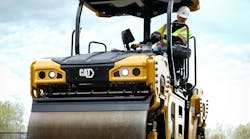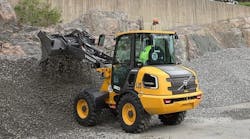As construction equipment evolves technologically, so does the level of technical expertise required to diagnose and repair these complex machines. Although heavy-equipment technicians have always needed a high degree of technical skill, today’s technician must be a master not only of mechanical and hydraulic systems, but also of complex, computerized control systems. Along with the skills and knowledge, our technicians need the necessary tools to diagnose these machines.
Increasingly, laptop computers make sense as a vital tool on the service truck. Just a few years ago, it was rare to see a contractor’s mechanic with a laptop. Many fleet managers considered them a specialty item reserved for dealer mechanics. But as computerized machines make up a larger proportion of our fleets while falling prices, increased wireless network availability, and more resources become available online, we have reached a point where it doesn’t make sense not to equip even contractor mechanics with wirelessly connected laptop computers.
More of our machines have electronic control modules (ECMs) that require a laptop computer in order to fully diagnose or calibrate. With the cost of downtime often running in the thousands of dollars per hour, it can be quite costly to dispatch a mechanic to the job only to find out he doesn’t have the capability to access the ECMs and must wait for a dealer mechanic to be dispatched to complete the diagnosis. A couple of hours of extended downtime could well pay for the computer that would have accelerated the repair.
Aside from interfacing with machine ECMs, wirelessly connected laptops can earn their keep in several other ways. For about the cost of one hour’s labor per month, a wireless broadband connection allows your field technicians to perform several labor- and time-saving tasks more efficiently. Save one labor hour a month and you have paid for the wireless data charges.
More manufacturers are making their parts and service information available online, and some include the capability to check dealer stock and place orders via the Internet, as well. Wireless access to this information can drastically reduce technician time waiting in the field for service or parts manuals, as well as duplicate trips by parts runners because a part ordered over the phone turns out to be incorrect.
When coupled with access to your company’s network, the potential for savings and efficiency gains from wireless connectivity increase. Travel time can be greatly reduced when technicians looking for a machine after hours are able to access machine location records and mapping tools. Lube technicians and PM inspectors can remotely access PM schedules to find machines that are due for service, eliminating wasted trips to check whether machines are due for service.
Additionally, technicians with remote network access can turn nonproductive time, such as that spent waiting on parts, into productive time by completing maintenance records and work orders from the field, rather than waiting until they return to the shop at the end of the shift to take care of their daily paperwork. I have seen technicians’ work days shortened by an hour to an hour and a half just from completing work orders and maintenance records during downtime.
There is another, hidden efficiency gain here. Rather than the technician filling out paper forms that must later be entered into the fleet management system, often by a clerk, the technician enters the information directly. This reduces redundancy and errors.
Don’t fall into the trap of thinking of your technicians as unskilled grease monkeys. Rather, recognize them for the skilled technical professionals that they are. Realize that they are a valuable, scarce resource and equip them with the tools they need to contribute to your organization’s productivity as efficiently as possible. The savings will more than pay for the hardware and connection fees.




